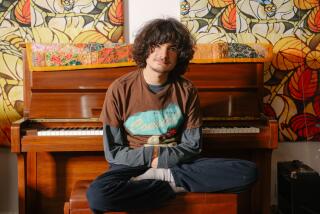Freeing Years of Trapped Emotions : Coping: New device will enable quadriplegic, who has been unable to communicate, to operate a computer with his tongue.
- Share via
Stacy Bibb has one link connecting him to the outside world: His tongue.
A quadriplegic, Bibb can only control the movement of his tongue. He can scarcely move his limbs and he cannot speak.
Today, he communicates by putting his tongue in different positions. When he sticks out his tongue, it means: “Yes.” When he only partially pokes out his tongue, it’s a tepid endorsement. And if he squirrels up his mouth, that’s a “No.”
But when man turned 17 earlier this month, his parents, Portia and Gary Bibb, arranged for a present that will change his life: A tongue-controlled keypad that will allow him to write on a computer.
Bibb, who will receive the device later this month, is one of six quadriplegics in the nation--and the only one in San Diego--to try out this new technology. The device promises to unlock a new world, one in which he can make his feelings and needs known.
“Stacy has worked so hard all his life,” said Portia Bibb, crying as she started to explain what the device will mean to her son. “I know he’s got a lot to say. It’s like he’s being born with this computer.
“It never seemed we were doing enough to get his thoughts out. Stacy has his face, his beautiful eyes. He can chew, he can swallow. But he can’t talk. Stacy only has his tongue.”
There are more than a million quadriplegics across the nation. The causes are varied, including spinal cord injury, muscular dystrophy and--as in Stacy’s case--cerebral palsy.
Stacy Bibb was born 11 weeks premature and weighed 2 pounds. At nine months, he was diagnosed as having cerebral palsy, a condition in which the body is unable to govern its muscles. Stacy’s doctor advised the Bibbs that they ought to forget they ever had a son and put him in an institution. The Bibbs never saw that doctor again.
Instead, they set about making the most of Stacy’s few abilities. So today, Stacy attends school, spends weekdays at a group home, and comes home on weekends. And for the last four years, the now-divorced couple has searched for a device that would enable their son to communicate better.
The Bibbs’ search for the appropriate technology to accommodate their son was a long one because nothing existed that suited his abilities. Stacy Bibb cannot use devices that are controlled by “sip and puff” technology, in which air is sucked out of or puffed into a straw.
Finally, the couple heard about a tiny Palo Alto company, Zofcom Inc., that had developed a retainer equipped with a tongue-touch keypad.
At Zofcom, a five-person company that operates out of a garage, co-founder Dan Fortune came up with the idea for the device after a friend became a quadriplegic as a result of a diving accident in 1975. Fortune created a device for his friend and in 1983, he teamed up with John Ortiz, a Stanford University graduate student, hoping to devise a marketable version.
The $6,000 finished model became available last spring. With this, a wireless transmitter is placed in the mouth like an orthodontic retainer, fitting into the roof of the mouth. The retainer has a keypad with nine buttons. When pressed, those buttons transmit a radio signal that is picked up by a controller box. The retainer can be used as a radio-control device that will allow the individual to operate audio and video equipment, turn on and off lights, open windows and doors, or control a computer.
In Stacy’s case, his parents decided to start him out with a more modest undertaking and learn how to use the computer.
“He can learn that other stuff later,” said Portia Bibb, a career counselor at UC San Diego’s International Relations and Pacific Studies graduate school. “We want him first to be able to communicate.”
Clearly, Stacy Bibb can communicate with his parents. But much of this involves an elaborate guessing game just to figure out basic needs and desires. When Portia takes Stacy to the movies, she opens up the newspaper and waits for Stacy to show her which movie he wants to see--which he does by sticking out his tongue and pointing toward the ad.
But there are other times, when Portia Bibb simply doesn’t have a clue about what Stacy is trying to tell her. Or sometimes it takes her a while to figure it out. After recently returning home after spending several days at Children’s Hospital, Stacy became very agitated. To his--and Portia’s--frustration, she couldn’t immediately understand what was bothering him. But she suddenly realized that he was trying to signal her that he wanted her to call the cable television company and re-start the service so he could watch MTV.
Occasionally, Stacy pulls pranks. Gary Bibb describes watching the recent Stephen King suspense movie “Misery” with his son. Just as the main character gave the finger to his tormentor, Stacy lifted his own finger.
“It’s a crude accomplishment for him,” said Gary Bibb, a special education teacher, who was clearly thrilled by his son’s joke.
Stacy Bibb has the hankerings of any youngster his age--he loves horror movies, cheeseburgers, MTV, heavy metal as well as rock ‘n’ roll music. He attends school and lately he’s developed a taste for tie-dyed T-shirts. He used to have an earring in his left ear, but it kept catching on the collar brace that holds his head upright, so it had to go.
But in other ways, Stacy Bibb is very different. Like many afflicted with cerebral palsy, his growth has been slowed, in part, because eating is physically difficult. Unable to relax his muscles, he burns up a tremendous amount of calories. At 17, he weighs only 60 pounds. And though he will continue to grow for three years, he’s not likely to physically resemble his peers.
Since doctors cannot fully communicate with Stacy, they are unsure of his intellect. At school, he functions at a third-grade level.
“It’s like somebody from a foreign country, if you don’t speak the language, you can’t tell how intelligent they are,” said Dr. Scott Mubarak, an orthopedic surgeon at Children’s Hospital who has tended Stacy for eight years.
“Stacy is in the group of kids who are bright and you are frustrated because you can’t do more for them. It’s exciting to see that technology has moved forward to improve his ability to function in society even in spite of his many handicaps. We’ve caught up to him.”
In San Pasqual High School’s special education program, Stacy has used a computer with a single tongue switch--a dinosaur compared to the technology he will soon use. With this device, there’s a switch outside his mouth that’s attached to his chin. He presses the device with his tongue to select an answer on the computer screen.
On Feb. 7, he scanned a series of letters, selecting them one-by-one, until he formed a message: “I love mom.” While his teachers thought he was just being affectionate, they didn’t realize it was Portia Bibb’s birthday--a fact that Stacy remembered.
After this message, Portia and Gary Bibb redoubled their efforts to find the technology that could convey their son’s thoughts and lessen his isolation. And as Mubark points out, treating Stacy will be far easier when the young man can tell him when he’s in pain.
To enable Stacy to sit up, Mubarak operated on him three times in recent years to put his leg back in the hip socket. And it’s not clear whether he’ll need these painful operations every few years for the rest of his life.
“Think of cerebral palsy as being a condition where it’s like a light switch that’s always on and the body doesn’t know how to relax,” Mubarak said. “The muscles in the groin are so tight that they squeeze like a nutcracker and push the hips out of the socket. With this device, he can tell me when he’s hurting--something he cannot now do.”
Portia Bibb laughingly says her son has given her an education. Today, she has heard of music groups that many adults don’t know--ones named Metallica, Poison and Skidrow. But her son has also provided her with a perspective that she never had, she says.
“Stacy is my biggest teacher,” Portia Bibb said. “He shows me how to appreciate everything I have--my legs, arms, everything. The sad side is always wanting him to be able to do more than he can do. But now he will have the chance.”
More to Read
Sign up for Essential California
The most important California stories and recommendations in your inbox every morning.
You may occasionally receive promotional content from the Los Angeles Times.













